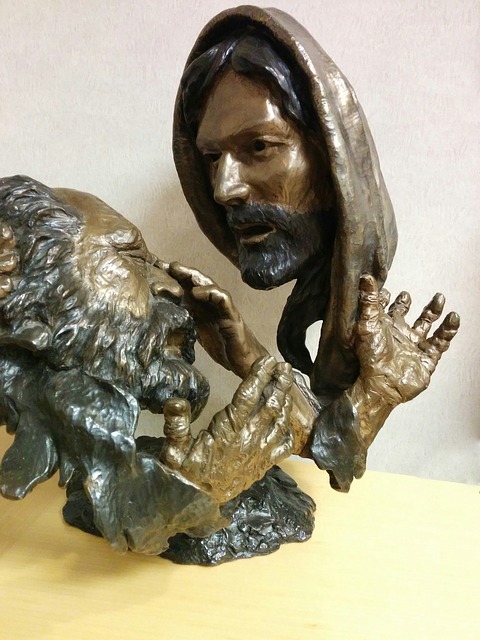“…emptied Himself, by taking the form of a servant…” – Philippians 2:7a
Seeing Clearly
We have spent the last couple of studies looking at the glory of God, discussing the fact that nothing on earth is more “valuable”. We also looked at the foolishness of exchanging God’s glory when nothing can compare to it. I wanted to write the prior two studies as a means of putting todays into perspective. The better grasp we have of the glory of God, the more clearly we will understand the sacrifice Christ made. The more clearly we understand the sacrifice Christ made, the less likely we will exchange the glory of God.
Glory Concealed
Philippians chapter two gives us Christ’s example of humility. We are told, “Let each of you look not only to his own interests, but also the interests of others. Have this mind among yourselves, which is yours in Christ Jesus, who though He was in the form of God, did not count equality with God a thing to be grasped, but emptied Himself, by taking the form of a servant, being born in the likeness of men. And being found in the human form, he humbled Himself by becoming obedient to the point of death, even death on a cross” (Philippians 2:4-8). In contrast to man, who exchanges the glory of God for an image, the Son of God empties himself and takes on the form of a servant! In other words, Christ “covered” His glory with flesh and blood.
Jesus did not lay aside His deity, but in a sense He willingly restricted it. Like a strong man that ties one arm behind his back. He doesn’t have less strength, he just restricts the strength he has. So it was when Christ became a man. He yoked His deity with humanity. For thirty years his flesh “hid” His glory. During the last three years of His life, the radiance began to break through more frequently. On the Mount of Transfiguration, the inner circle was given a glimpse of what the flesh was covering for a season. “And He was transfigured before them, and His face shone like the sun, and His clothes became white as light” (Matthew 17:2).
Why?
Why did Jesus “hide” His glory for a season? So we could enjoy it for eternity. Jesus temporarily “exchanged” His glory for servanthood because He loves us. More importantly, because He loves the Father. “He humbled himself by becoming obedient to the point of death, even death on a cross.” Jesus is jealous for the glory of God. Jesus knows nothing is more precious. Therefore, “though He was in the form of God, did not count equality with God a thing to be grasped.” Rather than clinging to what was rightfully his with a clenched fist, He emptied Himself with open hands praying, “Not my will, but yours, be done” (Luke 22:42b). A lesson in humility indeed. “Have this mind among yourselves.”
Our Savior sweat drops of blood. Our Creator carried a cross. Our God will be glorified. Sin has consequences. Especially for the sinless Savior. No one was more familiar with sin’s consequences than Jesus. No one was more familiar with the sacrifice that had to be made to atone for sin than the Lamb of God. Looking around Heaven for someone to fix man’s dilemma wasn’t an option. Waiting for mankind to solve their problem wasn’t going to work either. Man’s only hope was God in the flesh. Deity yoked with humanity.
Glory Revealed
In the manger, Our Savior was born in “the likeness of men.” On the cross, He hung in “human form.” The flesh could only conceal the glory for so long. Mary covered Jesus’ humanity with “swaddling cloth and laid him in a manger” (Luke 2:7a). God revealed Jesus deity by rolling away the stone and raising Him from the grave. The grave cloths were left behind. A resurrected Savior doesn’t need burial cloths. God’s glory never again needs to be covered. Before His prayer of submission in the garden, Jesus offered up another prayer, “I glorified you on earth, having accomplished the work that you gave me to do. And now, Father, glorify Me in your own presence with the glory that I had with you before the world existed” (John 17:4-5).
Rewarding Exchange
Jesus exchanged His glory for servanthood. He died for our sins. He glorified the Father by accomplishing the work the Father gave Him to do. Jesus is now glorified in the presence of the Father with the glory He had with Him before the world existed. May we learn from the humility of Christ. May our desire be to glorify the Father on earth by accomplishing the work He has given us to do. It will often require laying aside our pride and taking on the form of a servant. For the child of God, it may be the most rewarding exchange.
“I made known to them Your name, and I will continue to make it known, that the love with which you have loved Me may be in them, and I in them.” – John 17:26
“Therefore God has highly exalted Him and bestowed on Him the name that is above every name, so that at the name of Jesus every knee should bow, in heaven and on earth and under the earth, and every tongue confess that Jesus Christ is Lord, to the glory of the Father.” – Philippians 2:9-11





